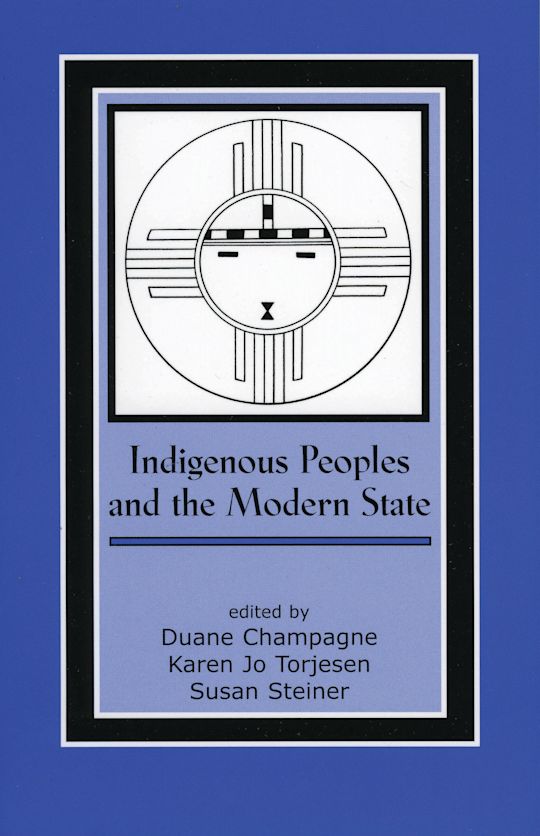- Home
- ACADEMIC
- Politics & International Relations
- Introduction to International Relations
- Indigenous Peoples and the Modern State
Indigenous Peoples and the Modern State
Duane Champagne (Anthology Editor) , Karen Jo Torjesen (Anthology Editor) , Susan Steiner (Anthology Editor)
- Textbook
Indigenous Peoples and the Modern State
Duane Champagne (Anthology Editor) , Karen Jo Torjesen (Anthology Editor) , Susan Steiner (Anthology Editor)
- Textbook
Exam copy added to basket
Choose your preferred format. Please note ebook exam copies are fulfilled by VitalSource™.
Buy from Bloomsbury eTextBooks
You are now leaving the Bloomsbury Publishing website. Your eBook purchase will be with our partner https://www.vitalsource.com.
Your credit card statement will show this purchase originating from VitalSource Technologies. They will also provide any technical assistance you might require.
You must sign in to add this item to your wishlist. Please sign in or create an account
Description
Champagne and his distinguished coauthors reveal how the structure of a multinational state has the potential to create more equal and just national communities for Native peoples around the globe. Many countries still face extreme differences among ethnic groups and submerged nations, leading to marginalization and violence. Examining these inherent instabilities in multicultural nations such as the U.S., Canada, Mexico, and Guatemala, the authors confront problems of coerced assimilation for indigenous communities whose identities predate the formation of the nation states, often by thousands of years. The contributors show how indigenous people seek to preserve their territory, their rights to self-government, and their culture. This book is a valuable resource for Native American, Canadian and Latin American studies; comparative indigenous governments; constitutional law; and international relations.
Table of Contents
2 Part I: Indigenous Identity and the State
3 Chapter 1: Rethinking Native Relations with Contemporary Nation-States
4 Chapter 2: Crossing Borders/Border Crossings: Native American Identity
5 Chapter 3: Status Indian: Who Defines You?
6 Chapter 4: Discussion of Indigenous Identity and the State
7 Part II: Culture and Economics
8 Chapter 5: The Culture of Leadership: Indigenous Leadership in a Changing Economy
9 Chapter 6: Doing our Share: Employment and Entrepreneurship in Canada's Aboriginal Community
10 Chapter 7: Discussion of Culture and Economics
11 PART III. Trilateral Discussions: Canada, the United States and Mexico
12 Chapter 8: We Come to Ask for Justice, Not Crumbs
13 Chapter 9: Competing Narratives: Barriers Between Indigenous Peoples and the Canadian State
14 Chapter 10: The Mayan Quest for Pluricultural Autonomy in Mexico and Guatemala
15 Chapter 11: Indigenous, Cosmopolitan, and Integrative Medicine in the Americas
16 Chapter 12: Discussion of Trilateral Exchanges between Canada, the United States and Mexico
17 Index
18 About the Authors
Product details
| Published | Jun 09 2005 |
|---|---|
| Format | Ebook (Epub & Mobi) |
| Edition | 1st |
| Extent | 208 |
| ISBN | 9780759114807 |
| Imprint | AltaMira Press |
| Series | Contemporary Native American Communities |
| Publisher | Bloomsbury Publishing |
About the contributors
Reviews
-
Finally, a book on indigenous peoples of the North American continent, from the Arctic to Mesoamerica, a distinctly different version of the North American Free Trade Agreement-NAFTA-the cause of the Zapatista indigenous uprising in Mexico. Indigenous Peoples and the Modern State is a valuable addition to indigenous literature and will be a useful text for indigenous studies courses.
Roxanne Dunbar Ortiz, California State University, Hayward, Director of Indigenous World Association
-
Indigenous Peoples and the Modern State offers a broad and richly comparative study critically analyzing the generally contentious but occasionally cooperative relationships between aboriginal peoples and three contemporary states-U.S., Canada, and Mexico. Utilizing a 'trilateral' approach, the contributors focus on cultural identity, land, sovereignty, leadership, economics, intellectual property, and other topics that continue to animate the evolving relationship between Native nations and the states that formed in their midst.
University of Minnesota
-
This innovative collection is the only one I know of that examines indigenous issues in all three North American states: Canada, the U.S., and Mexico. While the three situations are very different, they are ripe for comparative analysis. The lens here is wide-angled, providing welcome introductions to a host of issues from politics to economy, from culture to intellectual property and indigenous knowledge.
Stephen Cornell
-
These essays and discussions collected fill a critical gap in our understanding of indigenous peoples. The collection, via comparative examination of Canada, Mexico, and the United States, break out of an overly narrow focus on indigenous peoples within one state, to subtly highlight the similarities and differences among indigenous peoples in various states.
Thomas D. Hall, Lester M. Jones Professor of Sociology, DePauw University, and editor of A World-Systems Reader



































